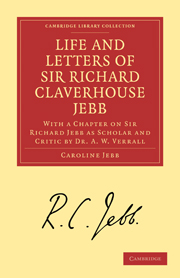 Life and Letters of Sir Richard Claverhouse Jebb, O. M., Litt. D.
Life and Letters of Sir Richard Claverhouse Jebb, O. M., Litt. D. Book contents
- Frontmatter
- PREFACE
- Contents
- CHAPTER I Family History
- CHAPTER II 1841—1858: Childhood and School Days
- CHAPTER III 1858—1862: Undergraduate Years
- CHAPTER IV 1862—1864: Fellowship and College Work.—Tour in Egypt
- CHAPTER V 1865—1870: Diary and Letters.—Public Oratorship
- CHAPTER VI 1871—1872: Letters to C. L. S.
- CHAPTER VII 1872—1874: Cambridge Life and Work
- CHAPTER VIII 1874—1878: Marriage.—Election to Glasgow Chair. Inaugural Address. Letters by Rev. Dr Denney, and Mr R. P. G. Williamson, M.A.—Visit to Italy and Greece.—Illness
- CHAPTER IX 1878—1880: British School at Athens. Hellenic Society.—Visit to Paris.—Challenge by Dr Blackie.—Visit to Venice
- CHAPTER X 1881—1883: Springfield.—Bentley.—Attack on Glasgow University.—The Troad.—School at Athens
- CHAPTER XI 1883—1889: Visit to America.—Professor Fawcett.—Death of Mr Robert Jebb.—Royal Academy.—Ode to Bologna.—Resignation of Greek Chair in Glasgow
- CHAPTER XII 1889—1894: Regius Professor of Greek at Cambridge.—Rede Lecture.—Election to Parliament. First Speech
- CHAPTER XIII 1894—1896: The Welsh Church Disestablishment Bill. Speech.—Illness
- CHAPTER XIV 1896—1898: Conference on Secondary Education.—Visit to the Riviera.—Voluntary Schools' Grant Bill. Sir John Gorst's Education Bill. Burial Grounds Committee
- CHAPTER XV 1898—1900: Death of Mr Gladstone.—Speech on the Rating of Clergymen.—Letters.—Romanes Lecture.—War. Consultation's Committee.—Knighthood
- CHAPTER XVI 1900—1901: Re-election.—Death of the Queen.—Deputation to Mr Balfour.—Irish University Commission
- CHAPTER XVII 1902—1903: British Academy.—Education Bill.—Tercentenary of Bodleian Library.—Trustee of British Museum.—Memorial Cloister at Charterhouse
- CHAPTER XVIII 1904—1905: Letters.—Order of Merit.—Defeat of Government
- CHAPTER XIX 1905: Visit to South Africa.—Last Illness
- The Scholar and Critic
- Index
CHAPTER XVII - 1902—1903: British Academy.—Education Bill.—Tercentenary of Bodleian Library.—Trustee of British Museum.—Memorial Cloister at Charterhouse
Published online by Cambridge University Press: 07 September 2010
- Frontmatter
- PREFACE
- Contents
- CHAPTER I Family History
- CHAPTER II 1841—1858: Childhood and School Days
- CHAPTER III 1858—1862: Undergraduate Years
- CHAPTER IV 1862—1864: Fellowship and College Work.—Tour in Egypt
- CHAPTER V 1865—1870: Diary and Letters.—Public Oratorship
- CHAPTER VI 1871—1872: Letters to C. L. S.
- CHAPTER VII 1872—1874: Cambridge Life and Work
- CHAPTER VIII 1874—1878: Marriage.—Election to Glasgow Chair. Inaugural Address. Letters by Rev. Dr Denney, and Mr R. P. G. Williamson, M.A.—Visit to Italy and Greece.—Illness
- CHAPTER IX 1878—1880: British School at Athens. Hellenic Society.—Visit to Paris.—Challenge by Dr Blackie.—Visit to Venice
- CHAPTER X 1881—1883: Springfield.—Bentley.—Attack on Glasgow University.—The Troad.—School at Athens
- CHAPTER XI 1883—1889: Visit to America.—Professor Fawcett.—Death of Mr Robert Jebb.—Royal Academy.—Ode to Bologna.—Resignation of Greek Chair in Glasgow
- CHAPTER XII 1889—1894: Regius Professor of Greek at Cambridge.—Rede Lecture.—Election to Parliament. First Speech
- CHAPTER XIII 1894—1896: The Welsh Church Disestablishment Bill. Speech.—Illness
- CHAPTER XIV 1896—1898: Conference on Secondary Education.—Visit to the Riviera.—Voluntary Schools' Grant Bill. Sir John Gorst's Education Bill. Burial Grounds Committee
- CHAPTER XV 1898—1900: Death of Mr Gladstone.—Speech on the Rating of Clergymen.—Letters.—Romanes Lecture.—War. Consultation's Committee.—Knighthood
- CHAPTER XVI 1900—1901: Re-election.—Death of the Queen.—Deputation to Mr Balfour.—Irish University Commission
- CHAPTER XVII 1902—1903: British Academy.—Education Bill.—Tercentenary of Bodleian Library.—Trustee of British Museum.—Memorial Cloister at Charterhouse
- CHAPTER XVIII 1904—1905: Letters.—Order of Merit.—Defeat of Government
- CHAPTER XIX 1905: Visit to South Africa.—Last Illness
- The Scholar and Critic
- Index
Summary
Theattempt to form an Academy which the meeting of 1899 had resolved upon was quietly pursued. In January, 1902, a petition for incorporation was presented to the King on behalf of The British Academy for the Promotion of Historical, Philosophical, and Philological Studies. The list of names attached to the petition could not well have been more remarkable, and the Times greeted the proposal as a “great advance in the organization of knowledge in Great Britain.” A charter was granted in the course of the year, Lord Reay accepted the position of President, a council of fifteen was elected, of whom Jebb was one, and the Academy was started. In a beautiful tribute paid to the memory of Sir Richard Jebb at the first meeting after his death, Lord Reay said:
“Those who are even but slightly acquainted with the first beginnings of the movement which culminated in the foundation of the Academy must know how great a part Sir Richard Jebb took in the work at that critical period. He was firmly convinced that a great future was in store for the Academy. He took a leading part in overcoming the difficulties that beset an institution at the outset of its career. He was never discouraged, and was always ready to grapple with the problems that confronted us His spirit is with us still.”
- Type
- Chapter
- Information
- Life and Letters of Sir Richard Claverhouse Jebb, O. M., Litt. D.With a Chapter on Sir Richard Jebb as Scholar and Critic by Dr. A. W. Verrall, pp. 372 - 397Publisher: Cambridge University PressPrint publication year: 2010First published in: 1907


